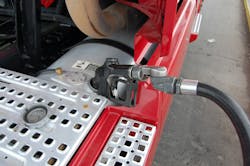Fitch Ratings endorses gasoline tax hike
Global ratings firm Fitch Ratings is backing a fuel tax increase proposed by the American Road & Transportation Builders Association (ARTBA) last week – characterizing ARTBA’s proposal as a “pragmatic” and “much-needed” way to stabilize the highway trust fund (HTF).
“The gas tax is the fastest and most reliable method to provide desperately needed resources to states for road and rail infrastructure projects,” Fitch noted in a statement. “A solution is imperative as the latest extension of funding for the HTF will expire on May 31.”
ARTBA’s plan would raise the federal gas tax by 15 cents per gallon yet offset it with a tax credit funded by a one-time repatriation tax on the foreign earnings of U.S. corporations – a plan that would increase HTF funding by $27 billion annually over a term of six years.
That six-year proposal “provides needed multiyear stability to facilitate long-term infrastructure planning after more than a decade of stop-gap measures that have created an atmosphere of instability and inefficiency incongruent with planning for long-lived [transportation infrastructure] assets,” Fitch noted.
“The lack of stability is one of the main factors contributing to the estimated $3.6 trillion that the American Society of Civil Engineers forecasts will be required in infrastructure spending through 2020,” the firm added.”
“Using the gas tax, which remains the most reliable source for surface transportation infrastructure projects through the medium term, provides the ability to plan for a smoother transition to a more sustainable and efficient funding source for the long term,” it said.
Yet Fitch readily admits that the ARBTA’s tax credit offset in this proposal subjects it to the political uncertainty that has resulted in a decline in transportation infrastructure.
“In our view, longer term solutions for the HTF could include a combination of different funding forms,” the firm pointed out. “These include taxes and fees and tolling of existing interstates that could be phased in over time.”
In the end, Fitch believes “new legislation” is needed to “wean the system off the ways of the past” and begin building a more “disciplined, outcome-driven, performance-based accountable framework” to better links the beneficiaries of transportation assets to those that pay for it.
